Richard & Nicky Rackham
Assistant Director Governance and Resilience NHS / Specialist Nurse in Organ Donation
Rotary of Billericay Mayflower/Billericay Town
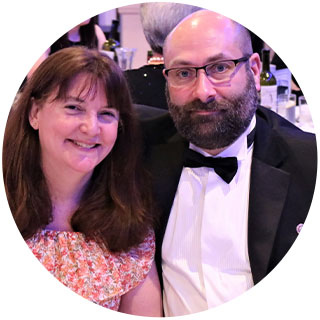

Richard was a scientist in the NHS working in diagnostic laboratories before moving into management.
As the Assistant Director for Governance and Resilience he helped lead the organisation on Brexit and the challenges that it brought.
But today Richard is faced with a new challenge, a challenge on how to tackle coronavirus.
As the NHS changes how it operates in order to cope with an increased demand in services, Richard has taken on a temporary role.
He is now the Pandemic Director for NHS Blood and Transplant, leading the response to coronavirus and ensuring that the healthcare system continues to be supplied with blood, organs and tissue cells.
Before the outbreak of COVID-19, Richard would travel up and down the country and across Europe working with other blood services. However, he now works from home to lead the response on NHS Blood and Transplant, attending online meetings and phone calls.
As coronavirus spreads, hospitals are moving some staff into other departments which are likely to be put under more strain than most, treating people with severe symptoms. “
For Nicky, the changes coronavirus has brought to the healthcare system have affected her job role significantly.
The training given to organ donation nurses is huge.
Not only are they speaking with people at possibly the most awful time of their lives – the death of a loved one – they also need to ensure the process of testing, retrieving, offering and transporting the organs is done so the best use is made out of this gift of life to those who receive these organs.
However, as coronavirus spreads, hospitals are moving some staff into other departments which are likely to be put under more strain than most, treating people with severe symptoms.
Nicky has been moved and is now working on an ITU ward directly with confirmed or suspected COVID-19 patients.
Like many others in the healthcare profession, the main message they want to share is: ‘stay at home’.”
Like many health professionals, what Nicky is most concerned about is the personal protective equipment provided to health care workers. Nicky is working with patients with severe symptoms and is doing all she can to ensure she does not bring the virus home to her family.
Both Richard and Nicky are working around the clock, working long hours, to support the NHS and the public, in unfamiliar circumstances.
The coronavirus has not just affected Richard and Nicky’s professional lives, but also their personal lives. They have two sons living at home aged 12 and 17.
They are thankful that their sons are old enough to mainly look after themselves and understand why they are working such long hours.
Like many others in the healthcare profession, the main message they want to share is: ‘stay at home’
David Hartley
Postmaster/ Rotary of Maghull and Aughton

David Hartley is the owner of a post office in Southport Merseyside. On a daily basis David, along with his staff at the post-office have a lot of interaction with the community, handling their parcels, dealing with money and transactions.
When coronavirus restrictions and guidance came into place, David understood he needed to provide staff with gloves and sanitiser to help keep themselves safe. However, this simple task proved difficult. Demand for disposable gloves and hand sanitiser rocketed once the public realised the seriousness of the coronavirus threat.
David is continually disinfecting any surfaces which are commonly used to keep the public who come into the post office and the staff as safe as possible.
The number of customers in the post office has reduced dramatically since social restrictions were put in place by the government. This concerns David as he still needs to pay staff and bills.
With the uncertainty of everything coronavirus brings, it is difficult to understand how long it will affect the sales, and income for David. However, he is determined to continue running the post office for as long as possible.
Natascia Santoro
Senior Physiotherapist/ Rotary of Elstree and Borehamwood
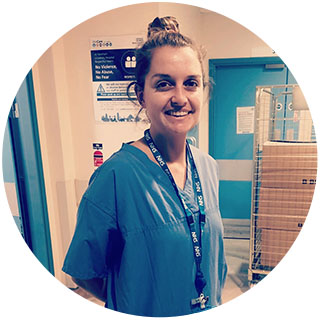

At the beginning of March, Natascia along with others in her team took part in inductions and training in order for them to be better equipped to help wherever they may be needed during the coronavirus crisis.
Another change that affected Natascia’s day-to-day practice, was how sessions with patients were conducted.
Sessions were no longer face-to-face and had to be done over the phone. This allowed patients to still get the support and guidance required, but avoiding face to face contact.
Natascia is now working alongside doctors and nurses, helping them with ventilation and mobility of the patients.
This change has been a challenge for Natascia after many years in physiotherapy, working with inpatients is very different.
Natascia added “Even in this hard situation, I am very proud to be part of the NHS, where solidarity, respect, teamwork and faith are predominate.
“I believe that together we are strong and will defeat the coronavirus, and everything that comes.”
Alan Armes
Coastguard Officer/Rotary of South Queensferry


Alan is part of a team of 12 who regularly assist police in searching for missing persons and being called out to emergency situations.
The work can often be high pressured, however, COVID-19 adds an extra risk to an already challenging job.
Since the outbreak of coronavirus, Alan along with other team members have attended several calls. The biggest challenge has been cross-contamination from casualties infecting the team and causing the whole station to close and self-isolate. However, coastguards are an emergency service, so they still attend when required, more mindful of cross contamination, and they are doing all they can to avoid this.
Carolyn Hallett
Teacher/ Rotary of Exmouth Raleigh
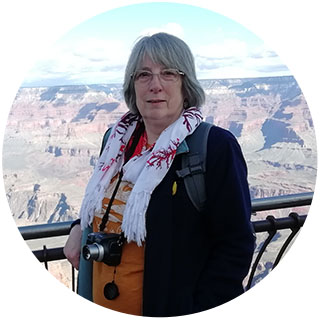

For the past 27 years, Carolyn from Exmouth in Devon, has been a special education teacher working with students who are blind or partially sighted, and also those with medical needs which prevents them going to school.
Until now Carolyn has resisted teaching online as many of her students have no contact with the outside world.
Many suffer with anxiety, depression or a medical condition which keeps them housebound. Therefore, for them to make contact with someone outside their family, this can be the first step to return to a more normal social life.
Carolyn has been a teacher for four decades, and has seen a few changes and crises in her time, but nothing like the changes coronavirus has forced upon the education system. “
However, with COVID-19, Carolyn has had to change her delivery method to an online approach, ensuring her students still got an education, but keeping to social distancing measures.
So while the majority of students are staying home, maybe with a learning pack or links to online platforms, Carolyn’s students are having lessons as usual, but via their computers.
Carolyn explained: “This is crucial for them to feel part of a system that cares, acknowledges their needs and is prepared to act quickly to meet them.”
Changing to an online approach was daunting at first. However, the students took to the change well, and Carolyn, along with the students, were able to adapt to the new way of learning quickly.
Carolyn added: “I had a somewhat surreal experience of talking to a student on my laptop, and waiting for a typed response – some anxious students don’t like microphones.”
I had a somewhat surreal experience of talking to a student on my laptop, and waiting for a typed response – some anxious students don’t like microphones.”
Carolyn has found the biggest challenge is keeping the year 11 students focussed. Their GCSE exams have been cancelled, however, she has been asked to provide a proposed grade, and evidence to back it up.
The Devon-based teacher pointed out how her colleagues who work in mainstream education, have also spent hours creating revision packs and doing everything they can to help their students and providing essential work.
Senior staff members are also working on whatever plans they can in these uncertain times for returning to school and normality, as well as the huge task of catching children up with the education they have missed out on.
All the while, she is continuing the mission that all teachers have: to enable people to have the best chance to thrive and succeed, whatever the circumstances.
Eirian Teague
Mental health counsellor/ Rotary of Brynmawr


Prior to the pandemic, Eirian was used to working with her patients face to face. However, due to social distancing, she has had to adapt her practice to online contact via Zoom calls with her patients, and finding creative ways to keep them engaged. Although it has been a challenging, the online contact has proved to be positive for allowing engagement and support to continue.
Eirian has witnessed people experiencing increased anxiety with social restrictions, plus the uncertainty about what the future may hold.
Seeing friends, family, grandchildren, is a simple pleasure which gives people joy. Not being able to see those you care about most can be a real struggle.
Eirian said: “It is really important to keep as much as your usual routine as possible. Stay in touch with your relatives and friends to help lift your spirits and ensure they are safe and healthy.”
She pointed out how a lot of dramatic language has been used to discuss the pandemic, and the language we use can contribute to raised anxiety.
Eirian wants to encourage people to modify their language to help reduce feelings of anxiety and panic “You aren’t stuck at home, you are safe at home.”
John Finnerty
Command and Control Room Co-ordinator at la Garda Station/ Rotary of Limerick Thomand
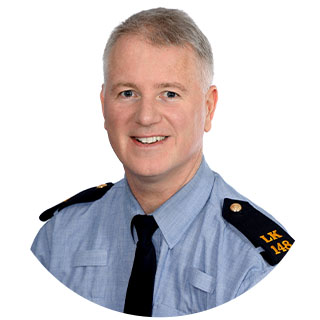

In March, the Irish Government introduced public health measures and restrictions on movement and social interactions. This change led to the police changing how it runs, in order to serve the new way the community is operating.
Many front line officers were tasked with policing new public health measures, ensuring communities were keeping within the new guidelines.
John was still being flooded with calls, however, the nature of them had changed. Rather than people calling to report crimes, he found many calls were from concerned citizens enquiring about the new public health measures, as well as many elderly people who were looking for advice and help.
John said: “Many people just want to be reassured, so a good listening ear is very important.”
He also added: “In Limerick we have been very proactive in providing assistance to the elderly and vulnerable.
“The police have formulated a COVID-19 community response team, bringing together 300 volunteers to help support people within the community with basic requirements such as collecting prescriptions and food shopping. “
Now, when John gets a call from an elderly or vulnerable person, he can refer them to the community response team knowing they will get the assistance they need.
Kelly Blankley
Service Manager, supporting homeless/ Rotary of Luton
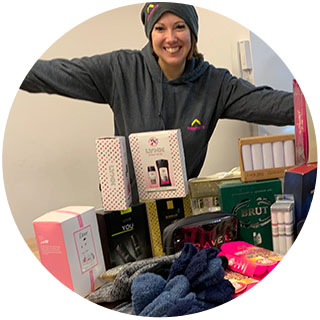

Since the outbreak of the coronavirus pandemic, the homeless have naturally been anxious and worried about the impact this will have on their lives.
A high percentage of their clients have underlying physical health conditions, meaning they could potentially experience more severe symptoms if they become ill.
Kelly explained that for clients who are sleeping on the streets of Luton, the situation was even more dire.
Rough sleepers lack hygiene facilities, so advice about washing your hands, and staying at home was impossible for them to follow – they have no home.
Kelly, along with the rest of the team at Signposts have been working with other organisations and the authorities, to find homeless a place to stay. They were able to get 26 rough sleepers off the streets and into hotel rooms and they continue supporting clients by bringing them food, and ensuring their health needs are met.
Kelly added “I have been overwhelmed by our staff, clients’ and trustees’ response to the pandemic. I am proud to be a part of this incredible team.”
Michael & Katalin Fernando
Consultant Paediatrician, Associate Medical Director / Consultant in Emergency Medicine, Trust Lead for Trauma Services, Director of Medical Education
Rotary of Yeovil


Michael, a consultant paediatrician explained: “We are doing our best to keep people safe and have changed the way we work to ensure this.
“Many clinics which would usually be face-to-face meetings are now done via telephone. The public are only advised to go to the hospital if it is needed.”
This helps to reduce the pressure in the hospital in order for the departments to work together more effectively and get on top of coronavirus.
Katalin was previously a doctor in the Hungarian Armed Forces. She has seen active service in Afghanistan, Iraq and Kosovo, working in a number of critical and high pressure situations previously, making her well prepared to deal with the pressures of the COVID-19 crisis.
She now works closely with the emergency department, a department which is the frontline in this battle against coronavirus.
Katalin was previously a doctor in the Hungarian Armed Forces. She has seen active service in Afghanistan, Iraq and Kosovo, working in a number of critical and high pressure situations.”
Michael explained the main areas of the hospital under the most increased pressure are the Emergency Medicine Department and Adult Intensive Care.
One of the most significant challenges the emergency team will face is maintaining an appropriate workforce. Katalin, along with the rest of the team, are looking after patients with severe coronavirus symptoms, putting themselves at risk on a daily basis, however, if they begin to show signs of coronavirus they have to self-isolate.
This could lead to the emergency department being under-staffed when they are under the most pressure to perform efficiently, in order to manage to coronavirus situation.
One of the most significant challenges the emergency team will face is maintaining an appropriate workforce. “
However, everyone in Yeovil Hospital has been working together to ensure the emergency department is prepared to handle a significant increase in patients. Nurses and doctors from other departments are being trained to work in the emergency department, to support the team, and step in wherever necessary.
Michael added: “A number of the paediatric team have undertaken additional training to ensure we can offer our colleagues in Adult Intensive Care additional practical support.”
Fortunately children tend to be less seriously affected than adults with COVID-19. Michael and Katalin have a four- year-old daughter and are grateful to the nursery supporting them with childcare.
Katalin, along with Michael, are both amazed at the level of support being shown to key workers by the public, and are grateful for all the support.
Belinda Artingstoll
Special Features Producer for BBC Radio Cumbria/ Rotary of Carlisle Castle
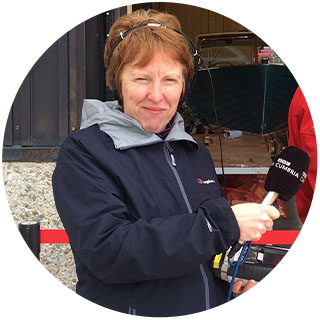

Belinda is used to being at the heart of many community activities and projects, so it was fitting that in light of coronavirus she set up an ‘information desk’ to report on pandemic.
Working from home, she began to collate information from a variety of sources for broadcast on BBC Radio Cumbria, with useful information and advice for those who may be struggling, during the isolation period.
Belinda added: “Across each day I also try to include information in the bulletins about ways to look after your mental health, how to protect yourself against the virus, help for local businesses and highlight any virus-related scams which might be doing the rounds.”
The toughest thing about this change has been missing the daily face to face contact she had with people in the community. Working from home and spending hours on her laptop for information is a huge change from her usual job, however, she continues to support her community with information.
David Jenner
GP Partner/ Rotary of Exe Valley


With the COVID-19 pandemic, David along with other members of staff, increased their hours to help support one another and the community.
There has been an increase in patients on the intensive care unit at the local hospital, and a predicated surge of cases across the UK, therefore David and the team at the GP surgery have created a clinic for suspected COVID-19 cases to support the local hospital and community.
Like many GP surgeries across the country, face-to-face consultations have been cancelled, and patients speak to doctors and nurses over the phone to decide what the best course of action for them is.
Another challenge which David, along with many health care workers face, is the concern over the standard of personal, protective equipment provided, as they are expected to be in contact with COVID-19 patients with just gloves, a plastic apron and a surgical mask.
Although these are challenging times, David has been overwhelmed with how much patients have shown compassion for him. He added: “In most consultations, I am asked how I am before I can ask that of them.”
Barry Woods
Warehouse manager/ Rotary e club 1070


For Barry, a Co-op warehouse manager in Wincanton, Somerset, the pandemic, particularly the first few weeks, was incredibly stressful and demanding.
Some weeks Barry would be sending the same amount of stock to stores as they would expect to send over the Christmas period.
The warehouse continues to operate, however, social distancing measures have been put in place to try and protect staff as much as possible. Markings have been placed throughout the warehouse to help remind colleagues of the social distancing policies.
Cheryl Law
Nursery owner/ Rotary of Wendover & District


With one nursery close to a hospital, Cheryl wanted to keep the site open for key workers children and offer the facility to others. However, as parents became more aware about the need to stay home, numbers reduced until the nursery was only looking after three children in one day. Sadly, this was not sustainable and Cheryl took the tough decision to close the nursery until further notice.
However, the second nursery still remains open and continues to care for the children of front line workers.
Cheryl explained: “Many of our parents are front line operatives – nurses, paramedics, doctors and police.”
When Cheryl announced they would stay open, almost every member of staff said they wanted to carry on working.
She added: “You see we are the constant foundation that these children have in a scary unsure emotional world. Mum or dad or both working very long hours. They can’t see their grandparents, or aunties, uncles, cousins, or friends.”
We are the constant foundation that these children have in a scary unsure emotional world. Mum or dad or both working very long hours. They can’t see their grandparents, or aunties, uncles, cousins, or friends.”
Cheryl explained that from a financial point of view, it would have been best to shut both nurseries. However, for Cheryl and the rest of the nursery team, supporting the parents who are key workers with child care is far more important.
Many of the parents are doing incredibly exhausting jobs, but they can do it knowing that their children are safe and loved and well looked after, and that the children can carry on being children, laughing and having fun – that’s what children should be doing.
Cheryl and the rest of the staff are all working together, and supporting one another to ensure they can continue to keep the nursery open, and the children they care for safe.
Many of the parents are doing incredibly exhausting jobs, but they can do it knowing that their children are safe and loved and well looked after, and that the children can carry on being children, laughing and having fun.”
She acted as ‘head chef’ along with others also stepping in, when a member of staff had to self-isolate.
Cheryl hasn’t forgotten about the children who usually attend the nursery, but are staying at home.
She has set up a virtual nursery through Zoom, YouTube and FaceTime Live. She offers interactive activities for the family to join in, to help parents who are at home with their children.
As well as ensuring the children in her area are cared for, if parents have to go to work, Cheryl has also signed up to be an NHS COVID-19 volunteer to help care for others in her community
Cheryl has also set up a GoFundMe page to help raise money to support key workers to say thank you for all the work they continue to do.
Angela Woods
Special Education Need Co-ordinator/Rotary e club 1070


However, the schools still operate to help look after the children of key workers, and vulnerable children. The teaching staff now work on a rota to ensure the minimum amount of people are in the school at one time.
Angela’s main concern is for the children who are isolating at home. She said: “We are making weekly phone calls to them, but for some children this will be a very stressful and unsafe time.”
She has created a YouTube channel which teachers are using to share and support children who are learning from home. Although education is important, for many families this time together is rare.
Angela added: “I just hope that parents are using this time to do things they don’t normally do with their children – bake, garden, play, imagine and just to have fun.”
Ian Levy
Member of Parliament for Blyth Valley/ Rotary of Blyth


Ian has been working hard to ensure everyone in the Blyth Valley region is being supported, particularly those who have had to self-isolate.
He said: “The government and Northumberland County Council have done a great job, and have risen to this challenge but I have also launched Blyth Valley Together.”
Blyth Valley Together is linking local groups who are supporting their community through coronavirus together, so they can combine their resources and help more people. Food parcels have been delivered to groups across Blyth Valley for distribution to local residents who need support.
Ian explained: “This project has made such a difference with new friendships being formed and people of all ages getting involved. The whole community has pulled together.”
Ian is determined to do all he can to support not only his community, but his family. As a husband and father-of-two, he expresses concern as to how the pandemic could affect those closest to him. He continues to work hard and find ways to support Blyth Valley and all the residents in the community.
Carol Cadwallader
Supermarket Shop Worker/ Rotary of Heywood


Since social distancing was put into place, the café closed, and Carol volunteered to work on the shop floor to help support the other staff members.
When the public became more aware of the seriousness of coronavirus, stockpiling became an issue. People were buying excess of certain products, causing a shortage in supply. In order to overcome this, many supermarkets began to ration products, to try and ensure everyone can get the products they need. Carol said: “I was extremely glad when Tesco brought in the rationing of products although it did not go down well with some of the customers.”
Carol said the majority of the customers are lovely and appreciative of all the hard work supermarkets and staff are doing, with many thanking them.
However, since working on the tills over the lockdown period, Carol along with other staff members have been verbally abused by customers who did not take well to the rationing policies when they were first put in place.
As people get used to the new rules in place, Carol says the days are a little easier, as customers become more understanding as to why these measures are for the good of everyone.


























































